
Michael Lovett is SVP and Ambulatory Division Manager of NextGen Healthcare of Horsham, PA.
Tell me about yourself and the company.
I am the senior vice president and ambulatory division manager for NextGen Healthcare and a member of the QSI Executive Committee. In my role, I am responsible for developing and implementing the ambulatory division’s strategic plan and ensuring that this plan is aligned with the company’s strategic direction. I also oversee day-to-day operational functions within the division and coordinate efforts across departments to promote operational efficiencies and achieve company goals. I am also responsible for shared operational policies and procedures to improve tools and solutions for client-facing organizations companywide.
NextGen Healthcare Information Systems is a wholly owned subsidiary of Quality Systems and provides integrated clinical, financial, and connectivity solutions for ambulatory, inpatient, and dental provider organizations.
Everybody talks about product usability and ONC seems interested in transparency in that area. What efforts does the company make in terms of usability and how do you see market demand affecting that?
Those are two great questions. Recently, we launched NextGen Ambulatory EHR 8 Series. It is our most advanced, easy-to-use, and transparent system ever. It has a new user-friendly interface, standardized framework for all templates, and streamlined navigation that is faster and reduces training requirements. It helps providers set the stage for patient-centered, collaborative, accountable care – key drivers in today’s changing healthcare landscape.
In addition, the 8 Series gives providers the tools they need to meet healthcare reform initiatives like Meaningful Use Stage 2 and ICD-10. Our new EHR system features automated outcomes reporting, enhanced disease management workflows, and precise content for over 25 medical specialties. At our most recent user’s group meeting, we received extremely positive feedback. We already have existing and new clients seeing its benefits. In fact, we have reports from clients who have reduced training time by about 50 percent and workflow from days to hours. Others have been able to see more patients.
With the complexity of today’s reforms, the market is hungry for solutions that are fast and easy to use while addressing the demands of compliance, quality, measurement, and reporting. In addition, the recent ONC 2014 certification of our ambulatory EHR includes requirements for and validation of user-centric design principles. To me, this provides another strong, positive answer to your question about our product usability and transparency.
A number of vendors are selling ambulatory systems through hospitals that either encourage or force their owned and affiliated practices to use the selected product. Does that trend worry you?
Not at all. Because of the success we have across so many specialties and up and down the size scale of practices, we have run into this a lot. The depth of our content and the ability to deliver appropriate workflows for the physicians give us an advantage over the hospital vendors who are trying to work their way into the ambulatory footprint. If hospitals are to have successful deployments, the physicians must see the positive benefits, which means it must fit their workflows. In many cases, “encourage” is just a euphemism for “force” and that never works out well in the long run.
Connectivity and interoperability are also key benefits to our solutions. We already have ambulatory practice clients who became part of a hospital system and who work seamlessly across the existing hospital’s platform. And, we offer both hospital and ambulatory HIT and EHR solutions so our company strategies align perfectly with this trend.
Athenahealth and Greenway did particularly well in the recent KLAS report. How are your offerings superior to theirs?
Now you’re trying to get me in trouble with my friend Tee. Jonathan will surely disagree with me, but we are superior to Greenway and athena in a number of ways, from the number of providers and leading edge practices we have as clients, to the content, ease of use, and functionality of our products and services.
While we understand a few of our 80,000 providers are not fully satisfied, we have made and continue to make great strides in increased satisfaction. The response at the user group meeting was great. Our internal satisfaction polling there showed very positive results.
A key point to note is that within the KLAS report, over 90 percent of our clients consider us as long-term partners. They see us as experts who can help them more easily connect with colleagues, hospitals, and payers; attest for MU2 and beyond; transition to ICD-10, and thrive in a pay-for-performance reimbursement model. All while improving care.
In the end, prospective buyers must realize that the survey firms are only talking to a small subset of the client base — in the case of KLAS, just 200 clients out of over 3,500 — and surveys should be used as one of many parts in the buying decision. In turn, it is our responsibility to stay close to the pulse of our clients through direct interactions and be responsive to their needs. The new account management programs we are implementing will help us make great strides with that. In fact, in the Black Book Rankings, announced on March 16, 2013, our NextGen Ambulatory EHR came in first place for highest client experience and customer satisfaction for several categories, including independent physicians associations with less than 150 physicians and physician group practices with over 250 physicians.
The company’s stock has fallen about 60 percent since April 2012, a time that has been quite favorable for some EHR vendors. How has this impacted company priorities?
Over the last year, many EHR venders have had their ups and downs. Our strategies and priorities, however, have remained on target. Our company is focused on the future delivery of healthcare including pay-for-performance accountable, collaborative care. We continue to develop our broad range of innovative and integrated ambulatory and hospital products and services. As a result, our award-winning solutions rank us as one of the top four EHR vendors in Meaningful Use attestations.
From the Wall Street perspective, we have seen many new investors buy into long positions with our stock. That means that they believe in the vision and the strategic plan that was introduced by our board at the last annual meeting. That gives us additional confidence that we are focused on the correct initiatives and as we deliver on those our stock performance will reflect that.
Do you see your inpatient and ambulatory offerings as two distinct lines of business or are there plans to integrate the offerings?
They are elements of a complete, comprehensive, and integrated HIT and EHR offering. For example, our EHR and practice management solutions are fully integrated and connected to our hospital and dental solutions. Moreover, our development team is unified under one organization for all of our divisions, thereby ensuring alignment of and innovations across all product and business lines.
Some are calling for EHRs that are open and that allow the use of third-party apps to add or change functionality. How would you summarize the state of openness of the EHR market and NextGen Healthcare’s interest in incorporating that capability?
Charlie Jarvis, our VP of health reform, and I sit in numerous meetings in DC where the subject inevitably turns to interoperability, connectivity, and data sharing. There are some vendors that simply can’t do that very well at the discrete level. We have always been and continue to be willing to work with other vendors where appropriate. We also have many interfaces for a variety of devices.
Interoperability is not new to us. We have been exchanging discrete data through our exchange with numerous vendors for some time. Our HIE and EDI solutions have been providing access to all available relevant patient data to help providers improve care quality and patient safety. With NextGen HIE, providers can collect, store, and securely share patient information, regardless of what EHR platform it may be stored within, bridging the gap between hospitals and physician practices while providing a channel for communication between communities.
What’s your opinion on HITECH and how do you predict it will impact physician systems in the future?
The HITECH act stimulated an incredible amount of EHR adoption across the ambulatory physician market. As a result, most medical providers — 70 percent — have now adopted or are in the process of installing EHR systems in their practices.
With high EHR adoption, the biggest challenge now facing providers is how to configure their EHR system to produce the outcome data needed to demonstrate their value-based care performance against objective medical criteria. Just as important is the interoperability between systems needed to compare these objective data points among healthcare providers. Without connectivity and interoperability, providers will find collaborative and accountable care more difficult to achieve.
As a result, the EHR industry is now vigorously supporting movement to standards that will create information highways that make health data readily available and easily interchangeable. Until these standards are fully in place, the challenges of data sharing will continue to be experienced across the entire industry.
In addition there are a large number of providers who purchased a solution that could only offer them a tool to enable the first stage of Meaningful Use. Many of those vendors don’t have the operational, technological, or financial resources to enable their clients to advance to the next stage. Because of this, the replacement market will continue to heat up. For providers in that situation, they will look for vendors that can offer them solutions that deliver more than just stimulus payments, but real function that transforms their practice. NextGen Healthcare is a vendor to help them be transformative. In fact, our NextGen Ambulatory EHR version 5.8 is now ONC 2014 Certified as a complete EHR to get our clients to Meaningful Use Stage 2. We are one of only three vendors to achieve that distinction at this time.

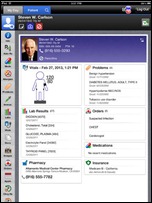
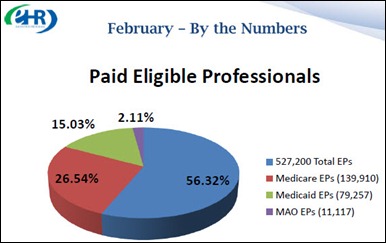

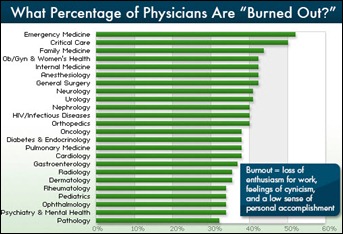
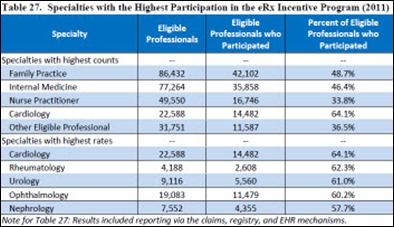






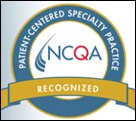




The article about Pediatric Associates in CA has a nugget with a potentially outsized impact: the implication that VFC vaccines…